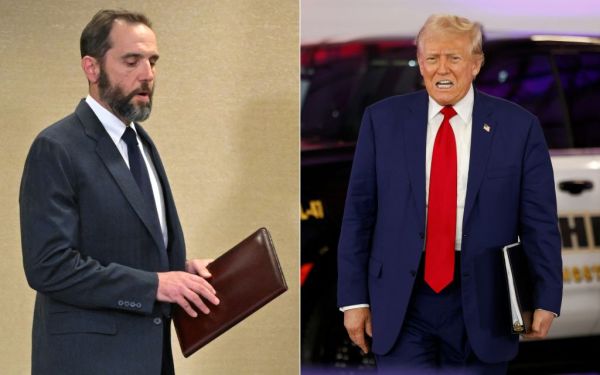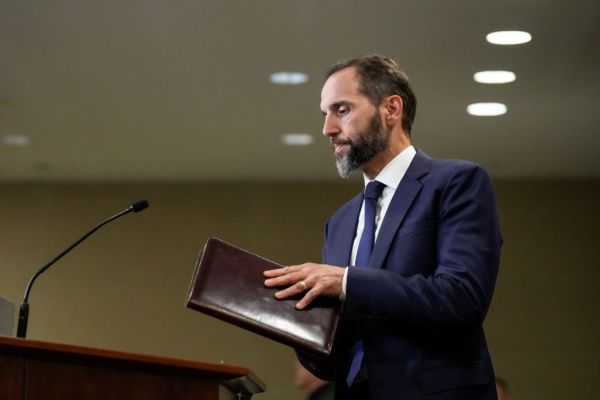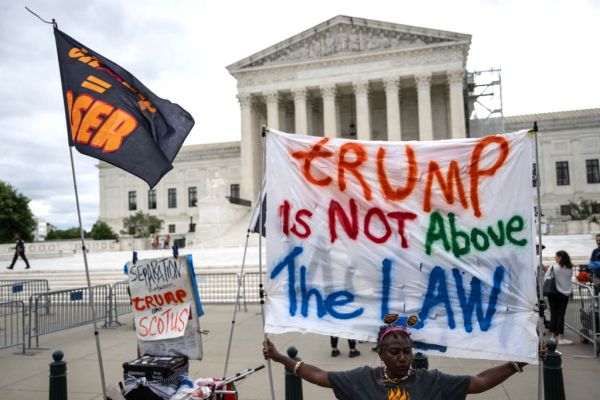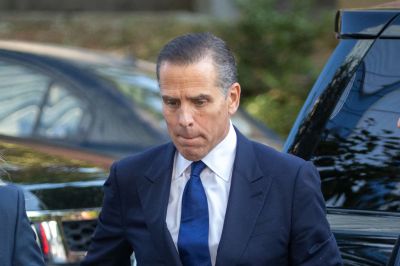Welcome back to The Collision, post-Labor Day edition. Today was set to be the first day of Hunter Biden’s federal tax evasion trial in California—a case that might have commanded the attention of the political press, the pro-Republican media machine, and even Donald Trump’s campaign if the Democratic nominee were still Joe Biden.
Down below, we’ll briefly get into the question of whether Hunter Biden’s case even matters in the presidential election anymore. But first, there’s a surprising amount of Collision-y activity going on in Trumpworld this week.
The Docket
- There could be a decision as soon as today, The Collision has learned, about whether Donald Trump’s sentencing hearing for his criminal convictions in New York will continue as scheduled, on September 18. The former president’s legal team has requested Judge Juan Merchan adjourn any sentencing until after the presidential election, even as Team Trump maintains that the verdict itself should be thrown out. Recall that since the Supreme Court’s landmark ruling this summer granting presidents limited immunity from criminal prosecution, Trump’s legal team has made two motions: one for the verdict to be set aside and the other for Merchan to recuse himself (the third such attempt by Trump). Merchan denied this latter motion last month, but not before alerting both the defense and the prosecution that the schedule would change so that his decision on the motion to set aside the verdict would come down on September 16, two days before the scheduled sentencing hearing. The decision Merchan could make today will be on whether that timeframe will remain.
- Relatedly, Trump also has made a motion to remove the New York case to federal court, but the federal district court judge rejected it in a decision earlier this week. Trump’s team immediately appealed the decision to the U.S. Court of Appeals for the 2nd Circuit.
- Trump was not in the federal courtroom in Washington, D.C., this morning when his attorneys filed his not-guilty plea in response to the new superseding indictment from special counsel Jack Smith in the federal election interference case. Lawyers for both the Justice Department and Trump sparred over how to proceed, not just with the case but even over the question of whether the new indictment is legitimate following the Supreme Court’s immunity ruling.
- Tonight, The Collision has confirmed, multiple surrogates and supporters of Trump will join a conference call with Trump aides and attorneys—including Boris Epshteyn, Todd Blanche, Will Scharf, and John Lauro—to coordinate messaging on all of the former president’s ongoing legal issues. Included in that list is a hearing Friday in Manhattan where Trump’s team will appeal a state civil court’s finding in May 2023 that he was liable for sexually abusing writer E. Jean Carroll in the 1990s. Punchbowl News first reported this call.
- It’s been a while since we’ve revisited the moribund Fulton County, Georgia, election-interference racketeering case. Way back in June, the Georgia Court of Appeals issued an order staying the case against Trump and his numerous co-defendants. The appeals court is considering an appeal of a superior court judge’s decision to allow District Attorney Fani Willis to continue prosecuting the case. Willis has been reprimanded and forced to let go a special prosecutor she had hired, Nathan Wade, after it was revealed they had had a romantic relationship around the time of Wade’s hiring. Central to Willis’ defense was her claim that her relationship with Wade had ended sometime during the summer of 2023—around the time Willis unveiled her indictment of Trump. But the Daily Mail has obtained some damning footage suggesting Willis and Wade remain a couple. Less than two weeks ago, the pair showed up together to a traffic stop where law enforcement officers had placed Willis’ adult daughter under arrest for driving with a suspended license.
Hunter Biden Wants to Take a Plea in His Tax Case. So What?

Jury selection was set to begin in another criminal trial against the president’s son, Hunter Biden, this week. Biden is charged with failing to pay more than $1.4 million in taxes from 2016 through 2019. But there was drama, which was unresolved at the time this newsletter published.
Instead of proceeding to trial, Hunter Biden attempted to withdraw his not-guilty plea and offered an Alford plea, in which he would in essence agree that the government has enough evidence to convict him and allow the judge to move forward with sentencing him all while maintaining his innocence. It has the same legal effect as pleading guilty but the defendant never admits guilt. Plus he would avoid an embarrassing trial and racking up additional attorneys’ fees.
The Justice Manual—the rules that federal prosecutors use at the Department of Justice—states unequivocally that federal prosecutors “may not consent to the plea known as an Alford plea except in the most unusual of circumstances” and that in such cases, they “should make an offer of proof of all facts known to the Government to support the conclusion that the defendant is in fact guilty” even without a trial. In the end, however, it will be up to the judge to decide whether to accept this highly unusual plea offer.
But let’s be real—does anyone care anymore?
When we asked a Trump campaign adviser earlier this week about how the Republican nominee’s team was preparing to message about Hunter Biden’s tax trial, the response was blunt: “The focus is Harris.”
Plea or not, as the son of the president prepared for his second criminal trial of the year—the first, on federal gun charges, ended with a conviction for Hunter—the political significance of his legal woes had shifted significantly. Back in June, we wrote how neither Democrats nor Republicans thought the gun trial verdict would hold much political significance. Trump and the GOP, on the other hand, believed that the tax case went to a core part of their attacks against Joe Biden:
The tax fraud charges—which like the gun charges are being brought by special counsel David Weiss—mean there’s great potential to draw attention to evidence that Biden’s family members, including Hunter, made money in the foreign influence game by trading on their last name. The Trump team is hoping the evidence prosecutors could unveil at that trial might cause swing voters to rethink whether Biden deserves to be rewarded with another term in office.
If that sounds familiar, it’s because it’s been the premise of the House Republicans’ impeachment inquiry into Biden. And despite plenty of hype around the investigation, including some drama over Hunter Biden defying a subpoena to testify before Congress, the inquiry has essentially fizzled on lack of evidence of any wrongdoing by Joe Biden himself.
But Joe Biden is no longer the Democratic nominee, and for that reason—along with that aforementioned fizzling out of the House GOP case against the Bidens—Team Trump appears to lack interest in making hay of this latest episode in Hunter Biden’s legal saga. Even Trump himself has scaled back his attack. His Truth Social account has been mostly quiet on the subject. There, Trump has recently referenced Hunter Biden either as part of his complaints about social media covering up stories about the Biden son’s laptop in 2020 or to ask, cryptically, “WHERE’S HUNTER?”
This lack of attention is understandable. With just 60 days until the election, every moment that Trump and his campaign spend not prosecuting their case against the actual Democratic nominee, Vice President Kamala Harris, is a moment wasted. And while Republicans are arguing that Harris should answer for what they consider to be the failings of the Biden administration (such as Afghanistan and the economy), tying the vice president to Joe Biden’s adult son’s business dealings and the sluggishness of the Justice Department to prosecute him may be a bridge too far.
Questions remain as to whether President Biden will pardon his son, who faces the potential of a year in prison just on the gun conviction. The president has repeatedly said that he would not pardon Hunter or commute his sentence. But that was when he was a candidate seeking reelection and not a lame duck in the final months of his presidency. After the election—win or lose—these questions will be back on the table.
Regardless of the political salience, questions about how Hunter Biden made his money and whether and how much his father knew about it were still set to haunt the trial this week. Perhaps this is the true motivation for Hunter Biden’s plea offer: His father’s reelection may not be on the line anymore—but his “Scranton Joe” legacy most certainly continues to be.
Sarah’s View
It’s worth wondering whether either of these cases—the tax case or the gun case—would have been brought if Joe Biden had announced his decision not to run for reelection two years ago. And that should bother us.
As many have pointed out, the circumstances of the gun charge were unusual. There has never been another federal prosecution for lying about drug use on gun form where there was just one gun, the gun was not used in a crime, there was no other crime committed with the gun, and the person had no criminal record.
And as far as the tax charges go, Hunter reportedly repaid the taxes he owed during the investigation. Others who have owed far more and repaid the government haven’t faced charges. For example, in 2020, the Department of Justice declined to bring charges against the CEO of a private equity company for what prosecutors called an “international tax fraud scheme” after he agreed to repay $139 million in back taxes. And come to think of it, I could say the same thing about Donald Trump’s New York falsification of business records case. And yet both Biden and Trump are almost certainly guilty of the crimes they were charged with.
Here’s Dan Abrams on NewsNation, making the point during Hunter Biden’s gun trial:
I just wish more people would be intellectually consistent on two cases that do raise similar concerns: Why the former president and the current president’s son were or are being tried based on legal theories that have literally never been pursued before. Like ever. You’ve heard so many on the right wanting the book thrown at Hunter Biden while at the same time declaring the Trump case a travesty of justice. All while many on the left are celebrating the Trump verdict, but believe Hunter Biden is getting a raw deal …
Let’s say what should be plainly obvious: If Donald Trump and Hunter Biden were average citizens, neither case would have been brought. And both former President Trump and Hunter Biden are also both likely guilty of the crimes that they were charged with. But if we were talking about Donald Smith and Hunter Davis, these cases wouldn’t have been brought. And yet so many partisans just insist on arguing that the case against one is a sham, while the case against the other is a slam dunk.
So what are we supposed to think about the tax case? My view is that it is sad. It is sad that a president’s son so flagrantly violated our laws—and in this case, expected other Americans to pay their taxes to fund our government while he lived the high life trading on his father’s political influence in that very government. It is also sad that we are at a point where partisans are so convinced that their political opponents are truly evil—and not just mistaken or wrong—that they believe treating them differently in our criminal justice system is not only justified, but essential to the preservation of democracy.







Please note that we at The Dispatch hold ourselves, our work, and our commenters to a higher standard than other places on the internet. We welcome comments that foster genuine debate or discussion—including comments critical of us or our work—but responses that include ad hominem attacks on fellow Dispatch members or are intended to stoke fear and anger may be moderated.
With your membership, you only have the ability to comment on The Morning Dispatch articles. Consider upgrading to join the conversation everywhere.